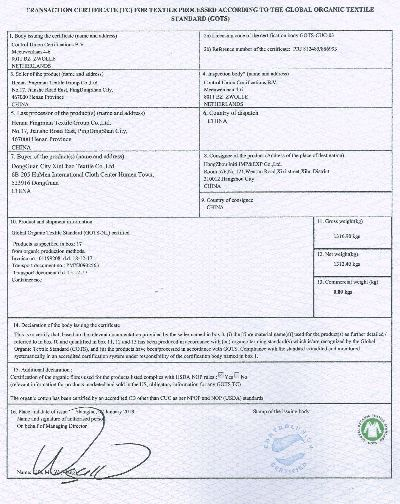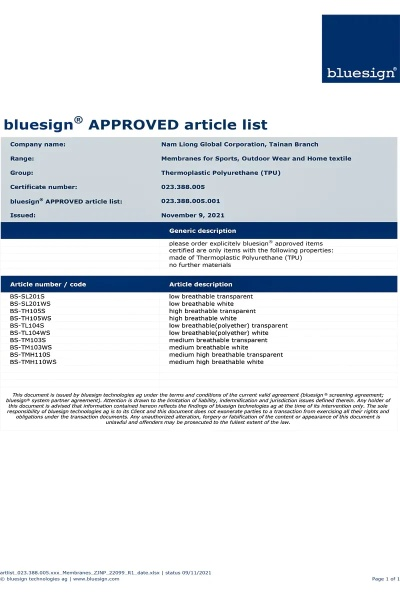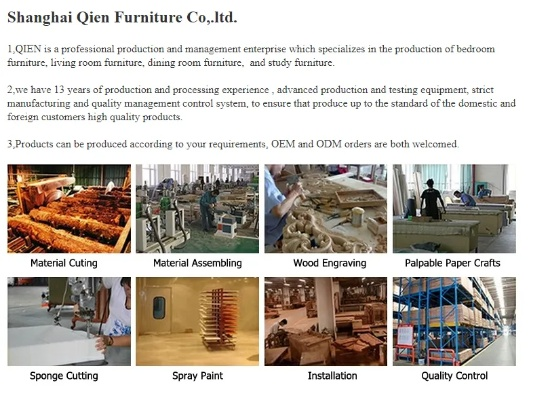The Importance of Textile Quality Certification in Global Trade
In the global trade landscape, textile quality certification is a critical aspect that ensures consumers can trust the products they purchase. This certification not only protects consumers from counterfeit goods but also promotes fair trade practices and sustainable development. It provides assurance to manufacturers and suppliers that their products meet international standards, which in turn enhances their reputation and market share. Moreover, it helps to reduce the risk of importing products that may cause health or environmental issues. Therefore, textile quality certification is essential for businesses looking to expand into new markets and maintain long-term success in the competitive global marketplace.
Introduction: In the world of textiles, quality is often the deciding factor between a product's success and failure. Consumers expect high-quality products that meet specific standards, which is why textile quality certification has become essential for manufacturers and suppliers to gain trust and market share. In this article, we will explore the significance of textile quality certification and provide an overview of the different types of certification available. We will also highlight some successful cases where textile quality certification has played a crucial role in achieving success.
Textile Quality Certification: Textile quality certification is a process that ensures that textile products meet certain standards and requirements. It involves testing and evaluating the fabric's physical and chemical properties, such as colorfastness, shrinkage, and tear strength. By obtaining a certified label, a textile manufacturer can demonstrate that their products are of high quality and meet internationally recognized standards. This not only enhances consumer confidence but also helps to differentiate products from those that do not meet these standards.
Types of Textile Quality Certification: There are several types of textile quality certification, each aimed at different aspects of fabric performance. Here are some common types:
-
Standard Testing: This type of certification involves conducting standardized tests on textile samples to evaluate their physical and chemical properties. Examples include the ASTM (American Society for Testing and Materials) tests for yarn and fabric properties, or the ISO (International Organization for Standardization) tests for textile materials.

-
Labelling Certification: This type of certification is used to indicate that a textile product meets specific standards or regulations. It may be issued by a government agency, trade organization, or independent third-party certification body. Examples include the European Ecolabel, the Global Organic Textile Standard (GOTS), or the Fair Trade Certified label.
-
Environmental Certification: As consumers become more aware of the environmental impact of textile production, certification bodies have developed environmental labels to indicate that textile products are made from sustainable materials or have low environmental impact. Examples include the Forest Stewardship Council (FSC) certification for wood pulp, or the Carbon Neutral Certification for cotton production.
-
Oeko-Tex Standard 100: This is a globally recognized standard for textile products that meet stringent environmental and health and safety requirements. It covers various aspects such as water pollution, soil contamination, and human health risks. Products that pass the Oeko-Tex Standard 100 certification are marked with the logo "Oeko-Tex Standard 100" on their packaging.
Successful Case Studies: One example of how textile quality certification has played a crucial role in achieving success is the case of a textile company in India. The company had been struggling to gain market share due to its lack of quality certification. However, they decided to invest in quality testing and certification programs. Within just a few years, their products were certified under various standards, including the Oeko-Tex Standard 100, and they saw a significant increase in sales and customer satisfaction.
Another example is the case of a textile company in China that was facing competition from other companies in the same industry. To stand out from the crowd, they decided to focus on developing eco-friendly and sustainable products. They obtained certification from the Forest Stewardship Council (FSC) for their bamboo fiber production, which helped them to differentiate themselves from their competitors. As a result, they saw a significant increase in sales and positive feedback from customers.
Conclusion: Textile quality certification is essential for manufacturers and suppliers who want to succeed in the global market. It helps to build trust with consumers and differentiate products from those that do not meet their expectations. By investing in quality testing and certification programs, textile companies can showcase their commitment to sustainability, environmental responsibility, and high-quality products. As the textile industry continues to evolve, it is important for companies to stay up-to-date with new certifications and standards to ensure continued success.

纺织品质量认证机构是确保纺织品产品质量的重要环节,对于保障消费者权益、维护市场秩序具有重要意义,本文将围绕纺织品质量认证机构展开讨论,并通过案例分析进一步阐述其重要性。
纺织品质量认证机构概述
纺织品质量认证机构是专门从事纺织品质量检测、认证和监督的机构,其主要职责包括对纺织品生产过程中的质量进行检测、评估和认证,确保纺织品符合相关标准和法规要求,认证机构还提供咨询、培训等服务,帮助企业提高纺织品质量水平。
纺织品质量认证机构的主要工作内容
- 检测与评估:认证机构对纺织品生产过程中的各个环节进行全面检测和评估,包括原材料采购、生产过程控制、产品质量检测等,通过科学的检测手段和方法,确保纺织品的质量符合相关标准和法规要求。
- 认证审核:认证机构对经过检测和评估合格的纺织品进行审核,出具相应的认证证书,认证证书是证明纺织品符合质量标准和法规要求的权威证明。
- 监督与管理:认证机构还负责对纺织品生产企业进行监督和管理,确保其生产过程符合相关标准和法规要求,对不合格的纺织品生产企业进行整改和处罚。
纺织品质量认证机构的案例分析
某知名纺织品品牌的质量认证历程
该知名纺织品品牌在纺织品质量认证方面取得了显著成就,其通过与专业的纺织品质量认证机构合作,建立了完善的纺织品质量管理体系,该认证机构对纺织品生产过程中的各个环节进行了全面检测和评估,确保了产品的质量和安全,该认证机构还为企业提供了专业的培训和咨询服务,帮助企业提高产品质量水平,该品牌获得了国内外众多消费者的认可和好评。

纺织品质量认证机构的成功案例
近年来,一些新兴的纺织品质量认证机构也取得了显著成就,某新兴纺织企业通过与专业的纺织品质量认证机构的合作,建立了高效的纺织品质量管理体系,该认证机构对纺织品生产过程中的各个环节进行了严格把控,确保了产品的质量和安全,该机构还为企业提供了全面的技术支持和服务,帮助企业提高产品质量水平,该企业在市场上获得了良好的口碑和业绩。
纺织品质量认证机构的运作机制
- 检测与评估流程:纺织品质量认证机构的检测与评估流程包括原材料采购检测、生产过程控制检测、产品质量检测等环节,认证机构还采用先进的检测手段和方法,确保检测结果的准确性和可靠性。
- 审核与颁发证书:经过检测和评估合格的纺织品,由认证机构进行审核并出具相应的认证证书,证书是证明纺织品符合质量标准和法规要求的权威证明。
- 监督管理机制:认证机构还负责对纺织品生产企业进行监督管理,确保其生产过程符合相关标准和法规要求,对不合格的纺织品生产企业进行整改和处罚。
纺织品质量认证机构是保障纺织品产品质量的重要环节,对于维护市场秩序、保障消费者权益具有重要意义,通过专业的检测和评估、严格的审核和颁发证书以及有效的监督管理机制,纺织品质量认证机构可以为企业提供全面的技术支持和服务,帮助企业提高产品质量水平,随着纺织行业的不断发展和变化,纺织品质量认证机构也需要不断更新和完善自身的检测和评估手段和方法,以适应行业发展的需要。
Articles related to the knowledge points of this article:
Organizing a Successful Textile Exhibition:A Comprehensive Guide
A Comprehensive Look into the Different Kinds of Fibre-Picking Devices
Top Ten Reputable Textile Testing Services Recommended for Quality Control



